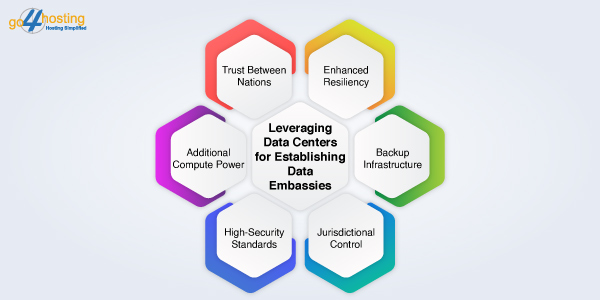Data Embassy-Powering India’s Tomorrow

On February 1st, 2023, Finance Minister Nirmala Sitharaman announced plans to establish data embassies in India to enable smooth digital transfers and ensure continuity for other nations. While this year’s interim budget session saw a limited discussion on the technological aspect. Data embassies hold significant potential to revolutionize India’s technology landscape and bolster its global standing.
Curious about what a Data Embassy entails? Wondering if it’s akin to a traditional data center in Noida? Rest assured, this blog post will address all your questions.
What is a Data Embassy?
A data embassy refers to a solution designed by nations to ensure digital continuity. It typically involves a set of servers owned by one country and operated within the borders of another country under the former’s jurisdiction. Data embassies enhance a government’s ability to survive potential crises, such as natural disasters, cyberattacks, or military invasions, by providing uninterrupted access to essential digital services.
Data embassies operate within bilateral agreements, often involving diplomatic immunity for the data and associated infrastructure. Such arrangements aim to preserve the sovereignty of the originating country regarding its data, operational processes, and technical choices.
For a data embassy to function effectively, it requires:
- Secure, resilient data infrastructure capable of protecting sensitive data from cyber and physical threats.
- Efficient backup and failover mechanisms.
- Agreements covering technical and contractual aspects to ensure the integrity and availability of the data stored in the facility.
- Delegation of a specific control over the data to the originating country.
One prominent example of a data embassy is the partnership between Estonia and Luxembourg, which was established in 2016. Other countries, such as Bahrain, have adopted similar models to ensure digital continuity and data sovereignty.
Data embassies can support governments in delivering enhanced services, such as during peak periods like elections or tax returns. They can also facilitate cooperation between countries. It allows for data sharing and resources while maintaining each party’s sovereignty.
As the world becomes increasingly dependent on digital infrastructure, data embassies will likely play an evermore critical role in preserving national interests and promoting international cooperation. Governments and multinational entities will continue to explore ways to leverage data embassies. It will aid to mitigate risks and foster greater resilience in the face of ongoing cyber threats and geopolitical tensions.
How can the Data Embassy Empower the Indian technological Landscape?
The concept of a data embassy is an innovative solution to cater to the digital continuity needs of nation-states. It offers extensions of a country’s data centers to other nations. The Indian government has indicated it will soon publish a new policy allowing both countries and corporations to build data centers in specific Special Economic Zones.
Officials indicated that data embassies would enjoy ‘diplomatic immunity’ from local laws, much like physical embassies. Establishing data embassies in India may facilitate data center business and attract foreign investments. To strengthen the diplomatic relations between India and user states, India needs to build a robust data protection framework within its legal systems. The data embassies are built around ‘corridors of trust,’ and India needs to build a strong environment of trust by ensuring transparency and a robust mechanism. It ensures efficient data backup and failover in case of data loss. The physical location of data embassies needs to be uniformly distributed across the country to facilitate nationwide technological development.
Is the data embassy and data center similar?

Data embassies and data centers, Noida are distinct concepts, although they share common ground regarding housing digital assets.
Data Embassies
- Are servers owned by one country and located in another country under that country’s jurisdiction?
- Serve to maintain digital continuity, ensuring government services remain available even in times of crisis.
- It typically involves bilateral agreements covering technical and contractual aspects of data storage and management.
- Offer additional computing power for peak usage periods and act as a backup for critical data.
Data Centers
- House computer systems and related data storage, processing, and distribution infrastructure.
- It can be privately or publicly owned and operated.
- Often, it focuses on maximizing efficiency, reliability, and scalability for commercial purposes.
Data embassies represent a unique application of data centers, Noida. It prioritizes sovereignty and digital continuity above profit motive. Countries implementing data embassies seek to safeguard their digital assets from threats such as natural disasters, cyberattacks, and political instability. Conversely, data centers in Noida are built to meet the requirements of private enterprises and governments seeking cost-effective and reliable data storage and processing solutions.
Can a Data Center be Utilized for a Data Embassy?
A data center, Noida can be utilized for a data embassy by hosting server resources outside the country’s territorial boundaries, under the country’s jurisdiction, to ensure the continuity of critical databases. This concept is particularly attractive for countries that have digitized their most crucial databases and must ensure digital continuity during natural disasters, cyber-attacks, or military invasions. The data embassy is established through bilateral agreements and can provide additional computing power for heightened server traffic. The most crucial element for a data embassy project is trust between partners, and it should be considered by every government, especially those in digitally advanced societies and small states, to ensure state continuity and functionality in emergencies.
Utilizing a data center in Noida for a data embassy offers several key benefits:
- Enhanced Resiliency
By locating data centers outside a country’s borders, nations can maintain continuous operations despite natural disasters, cyberattacks, or military conflicts affecting their home territory.
- Backup Infrastructure
Data embassies serve as vital backups for critical government-held data, often mirroring domestic data.
- Jurisdictional Control
Data remains under the jurisdiction of the originating country, allowing it to apply its own laws and regulations.
- High-Security Standards
Data embassies typically feature top-notch security standards, such as Tier IV certification, to prevent unauthorized access.
- Additional Compute Power
Data embassies can provide extra computing capacity during peak usage periods, enhancing overall performance.
- Trust Between Nations
Successful implementation requires strong relationships based on mutual trust between partner nations.
These features make data embassies appealing to countries seeking to enhance their digital continuity strategies.
My Two Cents

Data embassies represent a crucial innovation in ensuring digital continuity and sovereignty for nation-states. By extending a country’s data infrastructure beyond its borders through bilateral agreements, data embassies offer resilience against natural disasters and cyberattacks while maintaining jurisdictional control and security standards. As governments worldwide increasingly rely on digital infrastructure, the role of data embassies in safeguarding national interests and promoting international cooperation is poised to grow.
To explore robust data centers in Noida solutions like those discussed, consider partnering with go4hosting. We offer Tier-III data centers in Noida, Bangalore, Delhi, Jaipur, Chennai, and Mumbai. They are tailored to meet diverse needs and ensure data security and continuity. Trust in reliable data infrastructure is paramount, and go4hosting stands ready to support organizations on their digital journey.





